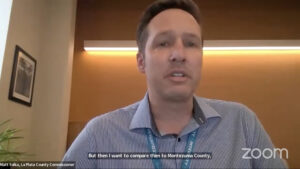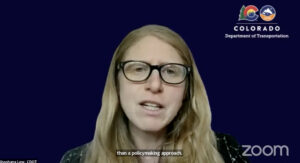Despite growing concerns from elected officials about stunting broadband expansion, the Colorado Transportation Commission approved a structure for fees that telecommunications firms and local organizations must pay to lay fiber in state highway right-of-way.
The fees seek to fulfill a provision in state law that requires the Colorado Department of Transportation to receive fair-market value for use of its roadside land. But opponents of the idea warned that the annual nature of the fees is significant enough that it could negate the business case for private companies or local governments to run fiber along long stretches of road to connect more rural and harder-to-reach locales.
The fees come as Gov. Jared Polis has said he expects $826 million in federal broadband funding the state received this summer will grow high-speed internet to 99% of Colorado and close the long-standing economic-development gap between the Front Range and rest of the state. The money must be spent by the end of 2027 or returned to the federal government, and the Colorado Broadband Office are now putting together plans on how to deploy the capital and to get enough fiber installers trained to allow the work to be done.
How the right-of-way fees work
For many years, CDOT has allowed right-of-way access to companies through a public-private partnership program that required some exchange of cash or property but hasn’t specified a set structure of fees. CDOT leaders argue that developing this program will let broadband firms and economic-development organizations know an exact cost as they begin projects — a one-time permitting fee of five cents per foot of fiber, as well as annual fees of three cents per foot in rural counties and 10 cents per foot in counties with populations of more than 200,000 people.

La Plata County Commissioner Matt Salka speaks to the virtual Colorado Transportation Commission meeting on Wednesday.
Public officials in smaller counties, as well as several members of the Legislature’s powerful Joint Budget Committee, have bristled at the annual fee, which they say could drive expansion costs and broadband bills high enough that companies will choose not to build out to needed areas. La Plata County Commissioner Matt Salka told commissioners before their vote Wednesday that the fee would be prohibitively burdensome in counties that have significant road mileage but fewer residents who could divide up the cost of the fee.
“I believe this will still continue the digital divide,” Salka said during the public-comments portion of the CTC meeting. “Every dollar of annual right-of-way fees paid to CDOT will result in fewer unserved locations receiving new service.”
Disagreement among transportation officials
But CDOT Intelligent Transportation Systems Manager Allie Axley said the initial fee will cover the cost of permitting-application reviews and the ongoing fee will pay to administer this new program and maintain the statewide fiber network that will be leased to companies. And CDOT Executive Director Shoshana Lew noted that the final fee structure will result in costs that are 90% lower than first proposed in March and are both fair and reasonable for fiber installers.
“This is a major concession on CDOT’s part,” Lew told transportation commissioners on Wednesday. “It’s substantively on the low end of what we think could come in the range of covering costs. And to a point that was made, it probably won’t cover costs.”
Debate on the 11-member commission also occurred in some ways on an urban/rural divide, with the two “no” votes from Mark Garcia, who represents 13 counties in southwest Colorado, and Megan Vasquez, who represents nine counties in the northeastern corner of the state. Garcia motioned to delay a vote on the proposal until staffers could research more about exemptions that federal law permits to receiving fair-market compensation for land usage, including an exception for public interests based on social and economic benefits.

Colorado Department of Transportation Executive Director Shoshana Lew speaks during the virtual Colorado Transportation Commission meeting on Wednesday.
“I think that recurring annual fee creates undue costs on projects that are being initiated by regional economic-development entities,” Garcia said.
Coming legislation on right-of-way fees
Colorado Counties Inc. has voted to seek introduction of a bill in the 2024 legislative session that would bar state agencies from charging annual fees for broadband-infrastructure installation along state rights of way. The session begins on Jan. 10.
Meanwhile, state Sen. Kevin Priola, D-Henderson, said he and others on the Joint Technology Committee are drafting a bill to put guardrails around the fees that could be charged and create an enterprise so fee revenue would be exempt from the Taxpayer’s Bill of Rights revenue cap. Rather than seek a ban on annual right-of-way fees, however, Priola told The Sum & Substance that he would like CDOT and its opponents to come up with more of a compromise that would guide the structure of the fees going forward.
Several commenters and commissioners alluded to the coming legislation and argued that the CTC should wait until it’s given instructions from the Legislature to push forward a fee structure.
However, CDOT officials noted that just because a bill is coming to limit right-of-way fees doesn’t mean that anything will be passed. And commissioner Jim Kelly said that by passing the existing proposal, the department will set that as a starting point for any future discussions and require the Legislature to point out how it should be changed and where any money for CDOT should come from if such a change is made.
“This would be a second option (to the existing public-private partnership structure), and it is about as low as you can reasonably go under the fair-market concept that we are told we need to follow,” CTC vice chairman Terry Hart said. “This is a compromise … Typically when you get feedback from both sides where everybody’s mad about something, you say ‘Well, maybe I’ve hit the right plan.’”
